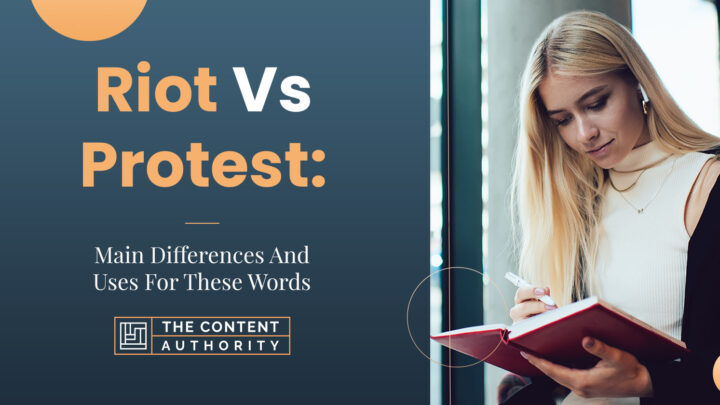Riot vs protest; what word do you use to describe an organized demonstration or public disapproval? Unfortunately, many do not know the difference between a riot and a protest. However, they are not the same; this post will explain why this is the case.
A riot is a state where the public members behave aggressively against the authority. In contrast, a protest is a declaration of objection to something, like a decision. It usually occurs because people feel powerless over the issue they object to. Thus, a riot is violent while a protest is peaceful.
Many people use the words “riot” and “protest” interchangeably because they refer to similar situations. However, there are some differences in their definitions that you should understand. Read on to find out these differences and everything in between.

Definitions Of Riot And Protest
When differentiating words that confuse people, like “riot” and “protest,” the best approach is to find their meanings. The definitions will provide you with key differences between these words. However, you can also go beyond the definitions and look at how people use these words. The words history and etymology also matter. Below are the definitions of “riot” and “protest:”
Definition Of Riot
According to the legal dictionary, a riot is an unlawful disturbance of peace conducted by several people. The characteristics of a riot are violence and a common intent to execute unlawful destruction of property and against other people.
Hence, refer to this word when describing a wild or turbulent disturbance in a specific area created by many people. For example, “The residents of South Beach responded to the new Abortion Bill with a riot.”
Another meaning for riot is “a noisy and violent public unrest caused by a crown protesting against another group, a policy by the government, or a decision they disapprove of. For example, “The riot caused many losses in the town.”
Definition Of Protest
A protest is “an expression of objection, disapproval, or dissent by the public in opposition of something or a person in power. A protest usually occurs when people feel powerless to prevent or avoid something or go against someone. For example, “We protest the new Abortion Bill.”
A protest is also “a public demonstration organized to express disapproval about something, like a policy by the government.” It is usually legally organized and does not involve violence. For example, “The employees organized a protest against their new leadership.”
In commerce, a protest is an official certificate attesting to the presentation of a bill, note, or check showing that payment has not been accepted. Therefore, protest, in that case, means the disapproval of payment by a formal notarial certificate. For example, “The company issued a formal payment protest after the goods failed to meet the expected standards. “
In Law, a protest is “an official report disagreeing with the legality of tax demand. Therefore, you can issue a protest for a tax or city exaction after paying it. For example, “I plan to protest the tax in my next filing.”
In sports, a protest is “a formal objection made by an official.” For example, “The coaches will protest the goal even though the referee does not agree.”
How To Properly Use Riot And Protest In A Sentence
The main reason the words “protest” and “riot” are usually confused is because some people misuse them. For instance, people use them to describe similar contexts, which should not be the case. Below is a guide for the proper use of “riot” and “protest:”
When To Use Riot
You can use this word as a noun or verb. As a noun, use it as the object or subject of your sentence. For instance, use it to describe a violent and noisy public disorder caused by a displeased or angry public. In a sentence, “The riot led to the destruction of thousands of dollars worth of property.”
You can also embrace the word “riot” as the verb meaning “to take part in a riot or disorderly outbreak by the public.” In this context, it is allowed to use the verb without an object. For example, “The students promised to riot if the school leadership did not listen to their complaints.”
Another context when you can use “riot” as a verb is to describe “living loosely or indulging in unrestrained revelry or joviality.” In this instance, you can also use this word without an object. For example, “Roman history shows that most citizens lived a riot lifestyle.”
More so, use this word as a verb (with an object) when describing spending money in riotous living. In this case, use the words “away” or “out” after the riot. That means the word appears in phrase form whenever you want to use it. For example, “Marvin chose to riot away his money” or “Kennedy will riot out his money.”
When To Use Protest
Use this word to describe a formal declaration or objection or disapproval of something or a demonstration to showcase disapproval over something. Use this word as a noun and sentence subject or object in this case.
For example, in a sentence, “The protest will continue until the government agrees to listen to our concerns” or “They agreed to the new laws without a squeak of protest.” You can also use it in the same context but as a verb (doing word). For example, “We will protest the decision because we were not part of the process.”
Riot vs. Protest: Main Differences
A protest and riot are often confused because they are both used when there is public disapproval of something, especially a decision by a superior figure, like the government or leadership. However, a riot is usually noisy and violent, while a protest is organized and non-violent. Also, a riot is usually illegal, while many states provide licenses for protests as long as they do not turn into riots.
The word protest originates from the Old French “protest,” and from Latin “protestari,” meaning “to declare publicly, object, or testify. Its first recorded use was in the 14th century. On the other hand, the word riot comes from Anglo-French “rioute,” meaning “to dispute, quarrel, argue, or cause domestic strife.” Its first known use was in the 12th century.

List Of Examples Of Riot And Protest Use In Sentences
With the knowledge of the definitions and how to use these words, you can start applying them in sentences. Here are some examples to guide you.
Examples sentences of “riot”
- The two-day riot caused the city millions of dollars in damages.
- The police arrested a dozen students at the riot.
- We lost our business after the riot.
- The students planned a riot after their administration ignored their demands.
- A riot is not the best or only way to express disapproval over a decision or a leader.
Examples sentences of “protest”
- The police watched the protest from the sidelines because the organizers followed the correct procedures.
- The protest organizers will present their issues to the board if they agree to a sit-down.
- The protest will continue for a week unless the leaders agree to listen to the protesters.
- The BLM protest was the biggest in the entire United States.
- I will protest the payment in the next filing because it does not make sense.
Conclusion
Protest and riots are similar because they involve a group of people expressing their disapproval of something or a decision by people in power. However, riots are more violent and disorganized than protests. Unfortunately, even peaceful protests can turn into riots when people get heated. Please read this post exhaustively and the sentences given to showcase the differences between “protest” and “riot.”
Shawn Manaher is the founder and CEO of The Content Authority. He’s one part content manager, one part writing ninja organizer, and two parts leader of top content creators. You don’t even want to know what he calls pancakes.

